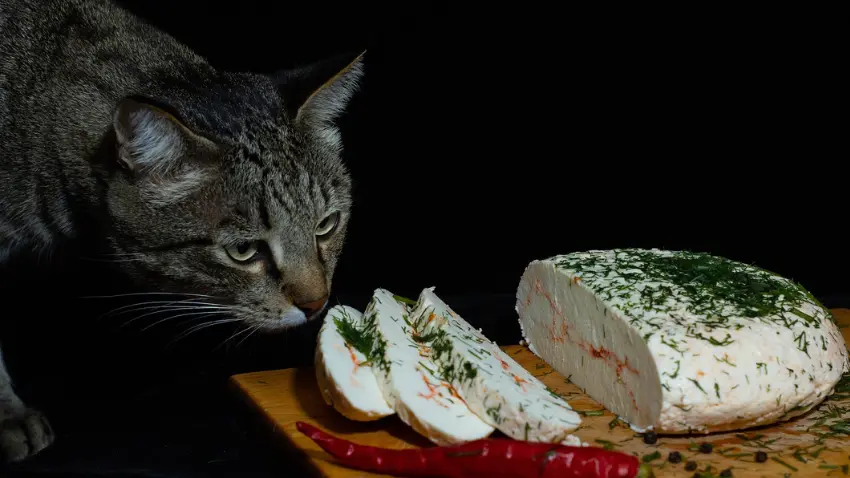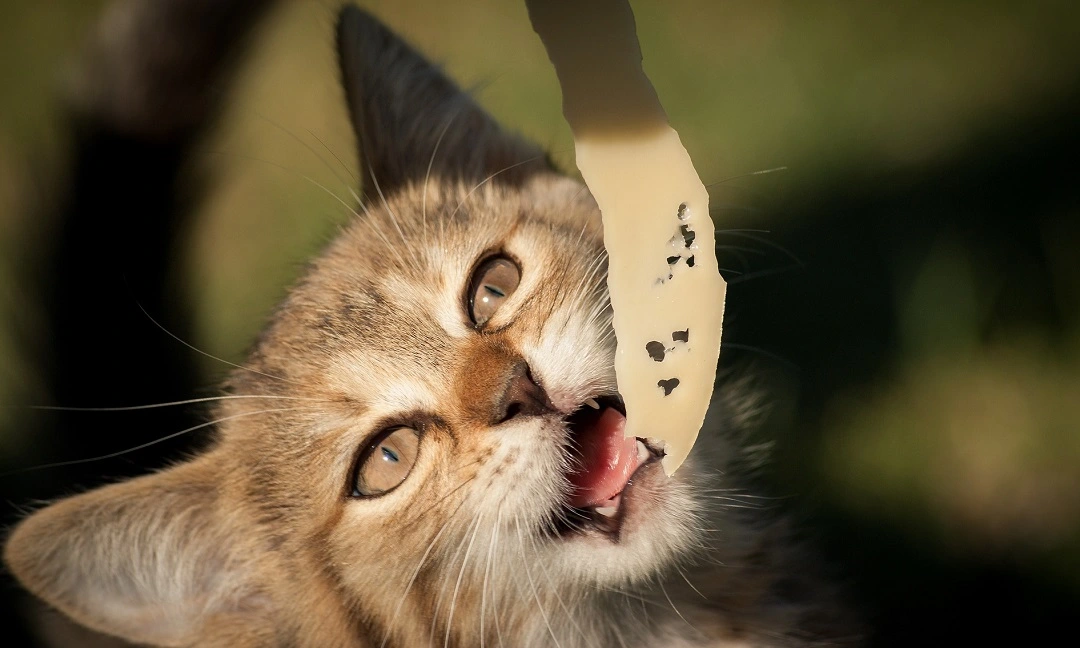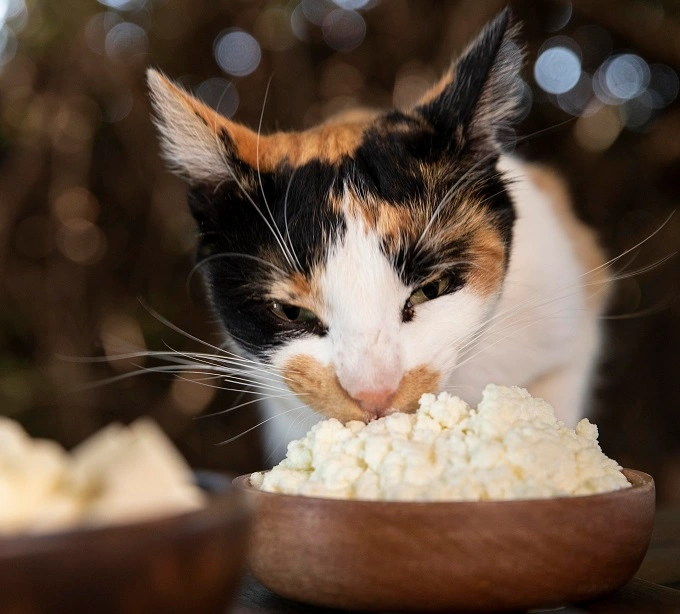Can Cats Eat Cheese? Here’s Why it’s a Big NO!
Can cats eat cheese? The simple answer is no. If you don’t know it yet, cats are notorious for being lactose-intolerant. This means their digestive system isn’t programmed to digest any food item containing lactose – one of which is cheese. Feeding your cat cheese may cause severe symptoms, which could even compromise the kitty’s life.
Is cheese safe for cats?


You should know that dairy isn’t a normal part of a feline’s diet. As obligate carnivores, cats get their nourishment from animal meat.
They never hunt for dairy products, especially since most dairy supplies are processed and a product of man’s intervention.
Even if your cat gravitates toward cheese, it will not benefit from the nutritional profile of such a food item. Cats are lactose-intolerant, which means felines don’t have lactase, the enzyme necessary to digest lactose found in dairy products.
If you feed your cat cheese, it will lead to gastrointestinal upset. Your cat will experience diarrhea, vomiting, lethargy, and other symptoms.
While cheese contains protein, it’s not the best source for felines. Aside from lactose, cheese is packed with fat. Giving your cat too much cheese will lead to feline obesity. Your kitty can easily pack excess pounds because of it.
Another thing you should watch out for is the salt content of cheese. Cheese like feta, blue, and halloumi are some of the saltiest types. And as you know, too much sodium can cause poisoning among cats. Also, the cheese may contain spices and flavorings that will cause further digestive irritation. Spices and salt can result in irritation and dehydration.
Anyway, an itty-bitty amount of cheese isn’t enough to upset your cat’s tummy. Sometimes, vets make an exemption to cheese if you’ll use it to administer medications. Still, it should only be in small amounts. It’s also essential to observe your cat for potential adverse reactions.
You should also note that each cat has varying lactose intolerance. Some cats can tolerate a small amount of cheese, while others suffer from diarrhea even on a smidgen bit.
To be sure, you should steer clear of cheese in your cat’s diet. If you want a quick treat for your cat, you can give a banana slice instead. Low-sodium crackers are also excellent alternatives.
Can cats eat cheese puffs?
Cheese puffs or cheese curls don’t just contain cheese. It’s a cocktail of salts, preservatives, and corn that will mess up your cat’s tummy.
Even for humans, the consumption of cheese puffs isn’t healthy. You should never toss this snack to your cat because it’s unsafe for the feline.
While a single piece won’t kill your cat, it’s easy to overindulge them with it. Also, you wouldn’t want your cat to get a taste of your Cheetos or Pirate’s Booty.
If they do, your kitty might try to steal a whole bag in the pantry and snack on the entire thing.
Remember that large amounts of cheese puffs will make your cat sick. For cats suffering from kidney problems, consumption of cheese puffs can be life-threatening.
Regardless of whether your cat is healthy or not, you should never feed it any kind of junk food.
Can cats eat cheesecake?
Cheesecake contains two lactose-rich ingredients: milk and cheese. Sometimes, it’s blended with other dairy products, which will wreak havoc on your cat’s tummy.
Besides, your cat doesn’t need a dessert. What your kitty needs is complete and well-balanced cat food. Even if your cat seems to be begging for the cheesecake, you shouldn’t give it any. Letting the cat lick the plate isn’t a good decision either. A cat with an overly sensitive stomach will suffer from discomfort and even adverse symptoms.
If your cat ate a small amount of cheesecake, it’s important to monitor it for 12 to 24 hours. You can also call the vet if you’re worried.
Are low-lactose cheeses safe for cats?
All cheeses don’t have an equal amount of lactose. There are low-lactose types like cheddar, Parmesan, and Swiss. People with lactose intolerance can manage a small helping of these cheeses without experiencing digestive problems. So the question is this: is it the same with cats?
I hate to be the bearer of bad news, but these cheeses aren’t suitable for cats either. Although low in lactose, Parmesan and cheddar are packed with salts.
This shouldn’t come as a surprise because most cheese puffs and similar products are often-flavored with these cheeses. It’s also the ingredient responsible for the salty flavor of your cheese-flavored snacks.
If you want to give your cat a dose of calcium and protein, you should look for safer alternatives.
Some of the best sources of calcium for felines are organ tissues, meat, and some legumes. These food ingredients are also excellent sources of healthy protein.
What to do if your cat eats cheese?

If your cat ate a small amount of cheese, you shouldn’t worry too much. However, if your pet has lingering conditions, you should observe your pet for any adverse symptoms. It might be best to call the veterinarian.
Cats’ instincts tell them that anything fatty is a good source of nourishment. This roots back to their diet in the wild, which is fresh and fat-rich animal meat. It’s the same reason why cats may overeat cheese even if they will experience side effects.
If your cat’s diarrhea and vomiting don’t subside within six hours, I suggest bringing it to the vet. Dehydration is your biggest enemy here. If your cat’s skin is tenting and its eyes look glassy, dehydration is already setting in. You must rush it to the vet to prevent life-threatening repercussions.
But if your cat’s condition seems to have improved after expelling the cheese out of its system, keep watch for the next hours. You should also give it a bland meal of rice and chicken. Canned and unflavored pumpkin will also help appease its tummy and restore its digestion.
What are other dairy products unsafe for cats?
Cheese isn’t the only dairy product you should watch out for. You should also steer clear of the following when it comes to your cat’s diet:
- Yogurt
- Cow’s milk
- Ice cream
- Butter
- Whey
- Tart
- Curd
- Oatmeal
- Casein
- Cream
- Custard
- Eggnog
- Kefir
These products contain high levels of lactose that your cat may not tolerate. It’s best to stick to cat food and treats made for felines. Besides, your cat doesn’t really need these extra human food items.
Conclusion
Can cats eat cheese? No, because it contains lactose that felines can’t digest. Also, your cat’s diet should mainly consist of meat protein and not any dairy products. While your cat may seem to enjoy cheese slices, it will only end up with explosive diarrhea, vomiting, and an emergency visit to the vet.
Restrict your cat’s diet and treats to feline-friendly products only. We hope the information from this article will help you take better care of your cat’s diet and health. Thank you for reading!
